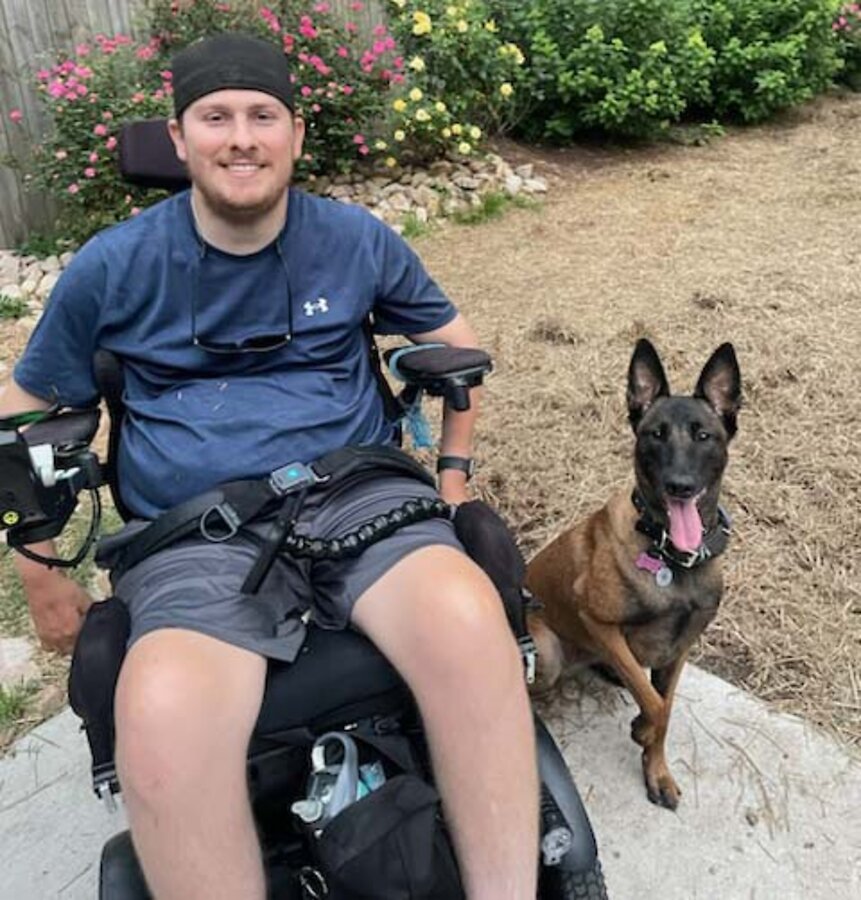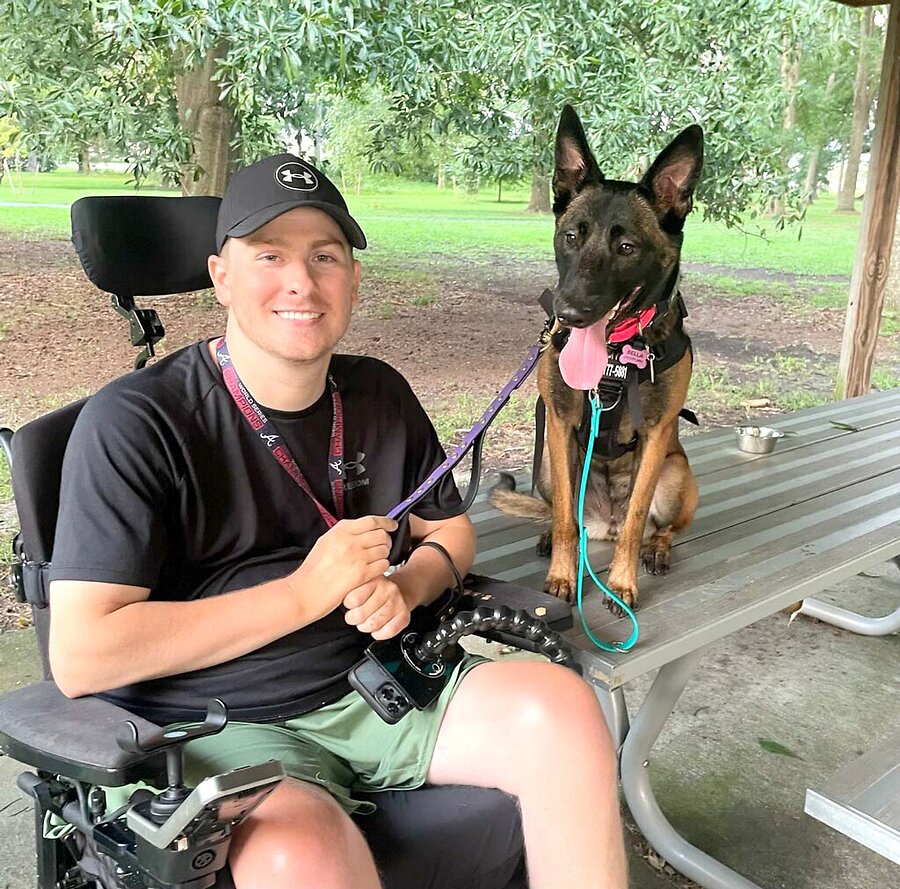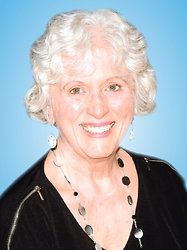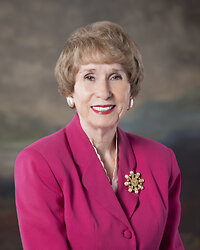JEFF DI FULGO
Five years after a debilitating injury, the Virginia Beach resident's story continues to touch and inspire others
by Rob Lauer

Jeff and his dog Bella
In April 2018, an inspiring story aired on a local TV news outlet. Virginia Beach resident Willie Burnam had been deemed a quadriplegic after being hit by a car in 2012. But a personal trainer at the Hilltop YMCA in Virginia Beach helped him change his life. Jeff Di Fulgo, then age 26, was a former Kellam High baseball star who went on to play at Norfolk State University, where he earned a degree in exercise science. For three years, he worked with Willie in three-hour sessions four times a week. As a result, Willie could walk with a walker-progress that could easily be described as miraculous.
But three months later, a tragic turn of events took place on July 14, 2018.
"I was bodysurfing at Croatan Beach," Jeff Di Fulgo, now age 31, recalls. "After taking a lunch break, I dove into a wave not knowing the tide had shifted. I hit my head on a sandbar. When I saw my arms floating limp in the water, I knew right away that I had injured my spinal cord. Before working at the Y, I would never have thought of that, but the day before, I had been working with a quadriplegic who wasn't supposed to ever walk. When my girlfriend at the time saw me floating in the water, at first, she thought I was playing. When she realized that I couldn't move, she called for help."
"I was rushed to Virginia Beach General," Jeff continues. "Dr. Wylie Zhu- one of the area's top neurosurgeons-happened to be there that afternoon, so I had surgery within hours of the accident. I had shattered my C5 vertebrae, so they had to remove my C5 and fuse my C4 and C6 with a metal plate. I now have no feeling from my chest line down. My hands have also been affected. I have a little grasp but no dexterity."

Dealing with his own debilitating injuries put a sudden halt to Jeff's inspiring work of rehabilitating others. Two weeks later, he was airlifted to Shepard Center in Atlanta, a facility specializing in treating spinal cord and brain injuries. There, he worked for three months, developing the skills needed to function daily. "Everyone at Shepherd Center was awesome," Jeff says, "Unfortunately, while there, I had reoccurring UTIs and ended up spending a month in the hospital with an infection."
One of the biggest hurdles Jeff faced at the time was sadness. "All these emotions began hitting me," he says. "I wondered how people would deal with me when I returned home. I handled those feelings by focusing on my therapy-working out every day," he says. "I drew on the discipline of my baseball days when I worked out every morning at 6:00 a.m. before going to work."
Community support kept Jeff motivated. "A local TV news crew flew to Atlanta to do a story on me while I was at Shepherd Center," he says. "Clients and co-workers from the YMCA were there for me. Friends threw fundraisers, and over a thousand people joined my Facebook page."
Jeff's puppy, Bella, was trained to become his service dog. Fourteen months after his injury, he started an Adaptive Sports program at Camp Grom in Virginia Beach to motivate others with disabilities. But when COVID hit in 2020, he experienced some setbacks. Gyms and physical therapy facilities adopted distancing measures to help ensure safety. âÃÂÃÂComing from an exercise therapy background, I couldn't get back into the physical therapy routine during the pandemic,âÃÂàJeff explains.
Five years after his injury, Jeff works to maintain a positive outlook while dealing honestly with some of the more disheartening changes the injury has brought to his life.
"I'm currently living with my parents," he explains. "I no longer have a 'mom-and-dad' relationship with them but a caretaker relationship. After a few years, when the continual support from others began going away, it was hard. Nowadays, people want to stop by for a visit during the week instead of the weekends. The anxiety of being alone and not having people around, of not getting off work on Friday and meeting up with friends-it's tough."
The routine of Monday through Friday workweeks with time off on the weekends and holidays creates a shared rhythm of life that most people take for granted. Those living with disabilities often feel cut off from that rhythm. Going to work and fulfilling obligations to others are considered by many to be weekday tasks. But people living with disabilities don't want others to see them as obligations. They want to remain in sync with the rhythm of their loved ones' lives. On the other hand, while most people sincerely want to "be there" for those in their life who are disabled, they sometimes hesitate, worrying that their disabled friends and family members will become too dependent upon them. To those with disabled loved ones in their lives, Jeff says, "Just strike a balance. Make time on a Friday or Saturday to just hang out with them."
When asked what advice he would give to those living with a disability, Jeff reflects for a moment before answering.
âÃÂÃÂBecause of my degree in exercise science and because I worked as a trainer with quadriplegics, I know what to look for and how to listen to my body,âÃÂàhe observes. âÃÂÃÂSo, my first bit of advice is to delve into your body. Pay attention to it, listen to it, and then be a fearless advocate for your body-when dealing with doctors, therapists, and others.
âÃÂÃÂFinally, always remember that everyone's case is different. You will have your own personalized struggles and adversities-but don't give up. Listen to that voice within yourself-even if it sometimes means ignoring others, as well intentioned as they might be. Your life is still your own, and you have to live your story.âÃÂÃÂ
The Shopper
1545 Crossways Blvd.
Chesapeake, VA 23320
757-317-5465
http://www.TheShopper.com
CURRENT COLUMNS
Publisher’s Point 
Time To Moveby Jean Loxley-BarnardChildren First 
Dandelion Timeby Becky AdamsRelationships 
When Your Security Blanket is in the Dryerby Dr. Bill AustinOn The Front Porch With You 
Memories of Homeby Rob Lauer

